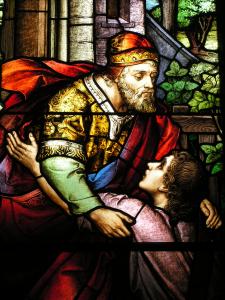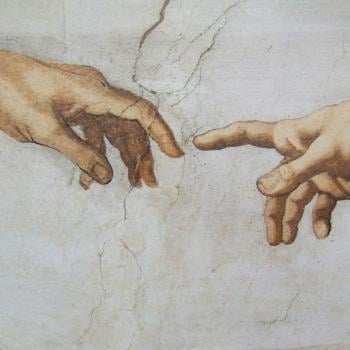
One of the most difficult things for Christians to navigate is the way they are to use the freedom given to them by Christ. If they are not careful, they will abuse it and lose themselves once again to sin. Sin imprisons us; it detracts from us, harming us and our ability to act, creating habits and conditions which limit us in their aftermath, destroying the freedom which we desire.
Christ grants us, indeed, restores to us, the freedom we were intended to have and can be found within us according to our nature. If we follow our nature, we will do what is good. When we do what is good, that good will become a part of us, so that its fruit will be ours, a fruit which will build us up and make us better, until we find ourselves transcending our nature, becoming more and more like God. This would not be possible, however, without God’s deifying grace; it is what allows us to grow and not be limited to our initial potentiality.
We must not misconstrue our freedom; we must not think we are free to follow any and all of our inordinate desires without being adversely affected by them. God frees us from “the law” – that is, from any external commands – not by denying the value of the law, but by giving us the grace to return to our original nature so that we will be free to do good without any external compulsion.
Paul, therefore, warns us, we must act in such a way as to keep our freedom. We must not think that if we are beyond the dictates of the law, all things are good. Far from it:
“All things are lawful for me,” but not all things are helpful. “All things are lawful for me,” but I will not be enslaved by anything. “Food is meant for the stomach and the stomach for food” — and God will destroy both one and the other. The body is not meant for immorality, but for the Lord, and the Lord for the body (1 Cor. 6:12-13 RSV).
Immorality remains immorality; what is not good remains not good. We are given freedom so that we should be able to properly engage all that is good and to use it for our own betterment, the betterment of others, and for the glory of God. We are meant for God. Our body is meant for God, to be a temple of God. When we are free, when sin does not imprison us, we are able to make room for God in our life. Then God will mix grace with our actions so that what we do can and will be greater than we could do without it. We will not need any external law, any external command, to tell us what to do; instead, we will know who and what we are by nature and follow that nature, being assured, therefore, that what we do will be good. We were made in the image and likeness of God; our nature imagines God, the God who is love. To act in accordance to our nature is to act in relationship to the image of God found within us, and so to act in and follow the dictates of love. Love frees us. Love truly inspires and makes us better.
Do you not know that your body is a temple of the Holy Spirit within you, which you have from God? You are not your own; you were bought with a price. So glorify God in your body (1 Cor. 6:19-20 RSV).
We must recognize the goodness of our own body and respect it. It is meant to be a temple of God. It is not a prison for the soul – sin creates that prison, not the body, but sin can use the body to keep our soul and body divided against each other, fighting against each other, so that when our focus is upon the material world, it might seem as if the body has become a prison to the soul. The body was created good; its desires are good desires, though they can become unbalanced when the body and soul are not properly integrated and work together. The grace Christ gives us helps us reestablish the proper balance which should be had between soul and body.
The parable of the Prodigal Son engages these truths. It is once a discussion of fallen humanity, and the way humanity can be restored to its proper place if and when it turns itself back to God, but it is also a warning against using the freedom we have been given so we do not lose it. We have been given a great inheritance by God. We should not abuse it, lest we find ourselves falling away from our glorious nature and become once again imprisoned by the filth of sin.
And he said, “There was a man who had two sons; and the younger of them said to his father, `Father, give me the share of property that falls to me.’ And he divided his living between them. Not many days later, the younger son gathered all he had and took his journey into a far country, and there he squandered his property in loose living (Lk. 15:11-13 RSV).
There are many different ways we can interpret the two sons. Of course, in saying this, we must also understand the weakness of any metaphoric engagement with the text. For example, the two sons could represent the soul and body. However, if we read it in this manner, it would seem that the body goes astray and the soul does not, but in reality, many of our sins are not of the body, but of the soul (envy, hatred, et. al.). The two sons could represent humanity and angelic creation, but again, if we consider angelic beings, we will know many of them are said to have fallen before humanity fell into sin, and, indeed, were involved in the corruption of humanity. What is important for us here is not to determine all the ways the parable can be interpreted, and the things we can learn from different interpretations, but rather, to see the way that one of the sons was given his inheritance, given the good intended for him, and he squandered it away. Humanity, likewise, was given great good by God. Through its own desires and inclinations, it turned away from God. It squandered the graces it had been given in order to establish itself in a new, wretched condition, one which cut it off from the fullness of God’s grace, leaving it incapable of embracing and acting upon the greater good. It imprisoned itself through its sin. We must be careful. We must not repeat the mistake of the fall. We must not take the good given to us, the freedom given to us thanks to our position as adopted children of God, and use it wrongly, for if we abuse it, we will find that the good given to us will not last, and we will then find ourselves once again stuck in the mire of sin.
The bounty of God’s graces transcends what we can receive. If we fall astray and let ourselves be imprisoned by sin, God can and will help us if we seek that help. No matter how many times we sin, God is there with grace and will rejoice if we turn back and seek that which we lost due to our own bad actions:
And he arose and came to his father. But while he was yet at a distance, his father saw him and had compassion, and ran and embraced him and kissed him. And the son said to him, `Father, I have sinned against heaven and before you; I am no longer worthy to be called your son.’ But the father said to his servants, `Bring quickly the best robe, and put it on him; and put a ring on his hand, and shoes on his feet; and bring the fatted calf and kill it, and let us eat and make merry; for this my son was dead, and is alive again; he was lost, and is found.’ And they began to make merry (Lk. 15:2-24 RSV).
Through baptism, we become children of God. The kingdom of God is our inheritance. We are given great grace, and with it, great potential and so great amounts of freedom. We must not think, like the prodigal son, think that we have been given a bounty to use as we wish, and so go out and abuse our grace. But if we do, the parable shows us that God will be there, ready to take us back. God loves us and wants all of us to share in the divine life.
Once we realize this, we should likewise discern how God is that way, not just for us, but for others. We should be angry when God welcomes anyone who, with humility and true repentance, seeks entrance into the kingdom of God. We should not think that if God welcomes them, God will abandon us, taking away from us the good God intends for us. The kingdom of God is filled with infinite graces, and what God takes from it and uses to restore one person does take away from what God has to share with others. There is no reason why we should be jealous or envious when we see God at work with others, helping them find their place in the kingdom of God. If we are not open to this, then we will ourselves be the ones turning away from the kingdom of God, abusing the graces given to us, abusing the freedom given to us; we will be the ones who need forgiveness, but since we do not think God should grant it to those who have gone astray, we will find God will not give it to us until we repent and change our minds. For only those who are merciful shall receive mercy, while those who would like to withhold it from others will find it withheld from them.
God wants us to be free. God wants us to love and be loved in that freedom. If we falter, if we stumble, God is willing to pick us up. But God does that for everyone. Let us rejoice and be glad whenever we see the fruit of God’s grace, either in our lives, or in the life of someone else. Let us rejoice and celebrate with God, for everyone who is restored to God will likewise be restored to us, and will have much to share and offer us as we have to share and offer with them. Together, we will be greater. Together, we will find greater glory in and with God. Why, then, do so many of us resist such unity and try, instead, to take our share of the kingdom of God and think we will be able to attain something better away from everyone else?
Stay in touch! Like A Little Bit of Nothing on Facebook.
If you liked what you read, please consider sharing it with your friends and family!













